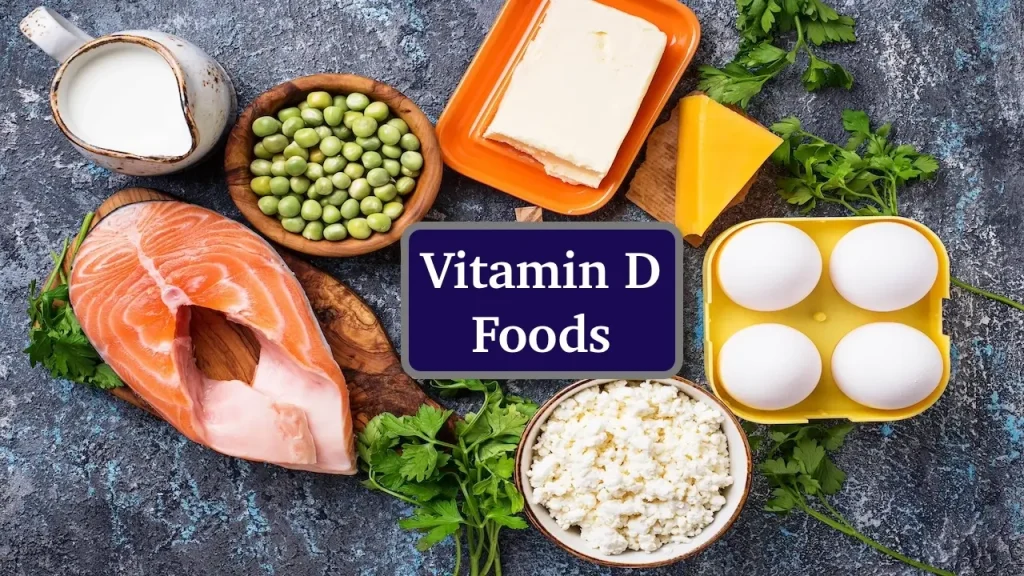The Ultimate List of Vitamin D Rich Foods
Including a variety of these vitamin D-rich foods in your diet can offer numerous health benefits, from supporting bone health to enhancing immune function. These foods provide essential nutrients that contribute to overall well-being, making them important additions to a balanced diet.

Here is a list of foods rich in vitamin D, along with details on why they should be included in your diet.
Fatty Fish and Seafood
- Salmon:
- Details: One serving of cooked salmon (3.5 ounces or 100 grams) provides about 526 IU of vitamin D.
- Benefits: Supports bone health, boosts immune function, and may reduce the risk of chronic diseases due to omega-3 fatty acids.
- Mackerel:
- Details: One serving of cooked mackerel (3.5 ounces or 100 grams) provides about 360 IU of vitamin D.
- Benefits: Promotes heart health, supports brain function, and is rich in omega-3 fatty acids.
- Sardines:
- Details: One can of sardines (about 3.8 ounces or 100 grams) provides approximately 193 IU of vitamin D.
- Benefits: Supports bone health, improves cardiovascular health, and is a good source of calcium and omega-3s.
- Tuna:
- Details: One serving of canned light tuna (3.5 ounces or 100 grams) provides about 268 IU of vitamin D.
- Benefits: Enhances bone health, supports brain health, and is rich in protein and omega-3 fatty acids.
Fortified Foods
- Fortified Milk:
- Details: One cup of fortified cow’s milk provides about 115-130 IU of vitamin D.
- Benefits: Supports bone health, improves calcium absorption, and strengthens the immune system.
- Fortified Orange Juice:
- Details: One cup of fortified orange juice provides about 100 IU of vitamin D.
- Benefits: Supports bone health, boosts immune function, and provides vitamin C for added immune support.
- Fortified Cereals:
- Details: One serving of fortified cereal can provide up to 100 IU of vitamin D.
- Benefits: Supports bone health, is often fortified with other essential vitamins and minerals, and can be a convenient breakfast option.
Eggs and Dairy
- Egg Yolks:
- Details: One large egg yolk provides about 37 IU of vitamin D.
- Benefits: Supports bone health, enhances immune function, and provides protein and other essential nutrients.
- Cheese:
- Details: Different types of cheese have varying amounts of vitamin D, but one ounce of cheddar cheese provides about 12 IU.
- Benefits: Supports bone health, provides calcium and protein, and is a tasty addition to meals.
Mushrooms
- UV-Exposed White Mushrooms:
- Details: One cup of UV-exposed white mushrooms can provide about 400 IU of vitamin D.
- Benefits: Supports bone health, boosts immune function, and is a low-calorie, nutritious addition to meals. They can be used in a variety of dishes, from salads to stir-fries.
- Portobello Mushrooms:
- Details: One cup of UV-exposed portobello mushrooms can provide about 400 IU of vitamin D.
- Benefits: Promotes bone health, enhances immune function, and is versatile for grilling, roasting, or using as a meat substitute in various recipes.
- Maitake Mushrooms:
- Details: Also known as hen-of-the-woods, maitake mushrooms can provide around 562 IU of vitamin D per cup when exposed to UV light.
- Benefits: Supports bone health, boosts immune function, and has potential anti-cancer properties. They can be added to soups, stews, and sautés.
- Shiitake Mushrooms:
- Details: One cup of UV-exposed shiitake mushrooms provides about 100 IU of vitamin D.
- Benefits: Supports bone health, enhances immune function, and contains other beneficial compounds like beta-glucans, which may help lower cholesterol. They are great in Asian dishes, soups, and stir-fries.
Why We Should Take Vitamin D-Rich Foods
- Bone Health:
- Role: Vitamin D is crucial for the absorption of calcium and phosphorus, which are essential for building and maintaining strong bones and teeth.
- Benefits: Prevents rickets in children and osteomalacia (softening of the bones) in adults. Reduces the risk of osteoporosis and fractures in older adults.
- Immune Function:
- Role: Vitamin D plays a key role in enhancing the pathogen-fighting effects of monocytes and macrophages, white blood cells that are important for immune defense.
- Benefits: Reduces the risk of infections and autoimmune diseases by supporting the immune system’s ability to fight off bacteria and viruses.
- Mood and Mental Health:
- Role: Vitamin D is involved in brain function and the regulation of mood.
- Benefits: May help reduce the risk of depression and improve overall mental well-being.
- Muscle Function:
- Role: Vitamin D is essential for muscle function and strength.
- Benefits: Reduces the risk of muscle weakness and falls, particularly in older adults.
- Heart Health:
- Role: Vitamin D is thought to have a role in maintaining a healthy cardiovascular system.
- Benefits: May help lower the risk of cardiovascular diseases, such as hypertension and heart disease.
Source:
- https://www.felixhospital.com/blogs/top-25-vitamin-d-rich-fruits-and-vegetables
- https://www.herbkart.com/list-of-vitamin-d-rich-fruits-vegetables-food-items
